
What is 3PL? Complete Guide To Understanding Third-Party Logistics & Warehousing
For businesses to run smoothly, they must find ways to manage their resources. This is referred to as logistics: the acquisition, storage, transportation and distribution of resources. Logistics management affects the entire fulfilment process, and poor logistics management can cause a ripple effect along the entire supply chain. Small businesses and startups can often handle logistics in-house, but as businesses scale and day-to-day operations become more complex, it can be difficult to keep up with demand. That’s where a third-party logistics company can help.
Are you starting a business and want to know your options when it comes to shipping and fulfilment? Read on to discover how outsourcing logistics can help small to medium enterprises (SMEs) optimise the fulfilment process, and whether 3PLs are the right fit for your business model.
What exactly is third-party logistics (3PL)?
A third-party logistics provider (3PL) offers outsourced logistics processes to businesses. A 3PL will take over warehousing, inventory management, picking, packing and other fulfilment processes, leaving your businesses to handle the rest. 3PLs enable businesses to automate various tasks, creating a more efficient supply chain. They may even assist with the returns process, improving your customer service.
Services provided by a 3PL company may include:
-
Freight brokerage or forwarding: 3PLs will determine the most efficient route for your product through the supply chain and negotiate with freight service providers to find the best shipping solutions and rates for your freight.
-
Inventory management: 3PLs will provide inventory management services to help businesses optimise their inventory levels, reduce carrying costs and enhance order fulfilment. They may also provide warehouses and distribution centres to store and manage inventory on behalf of their clients.
-
International logistics: For businesses involved in international trade, 3PLs provide customs brokerage services to facilitate the clearance of goods through customs and ensure compliance with import/export regulations.
-
Technology solutions: Many 3PLs offer technology solutions and software platforms to streamline supply chain processes, improve visibility, and enhance collaboration.
-
Consulting services: Some 3PLs provide consulting services and strategic planning support to help businesses optimise their supply chain strategy and improve operational efficiency.
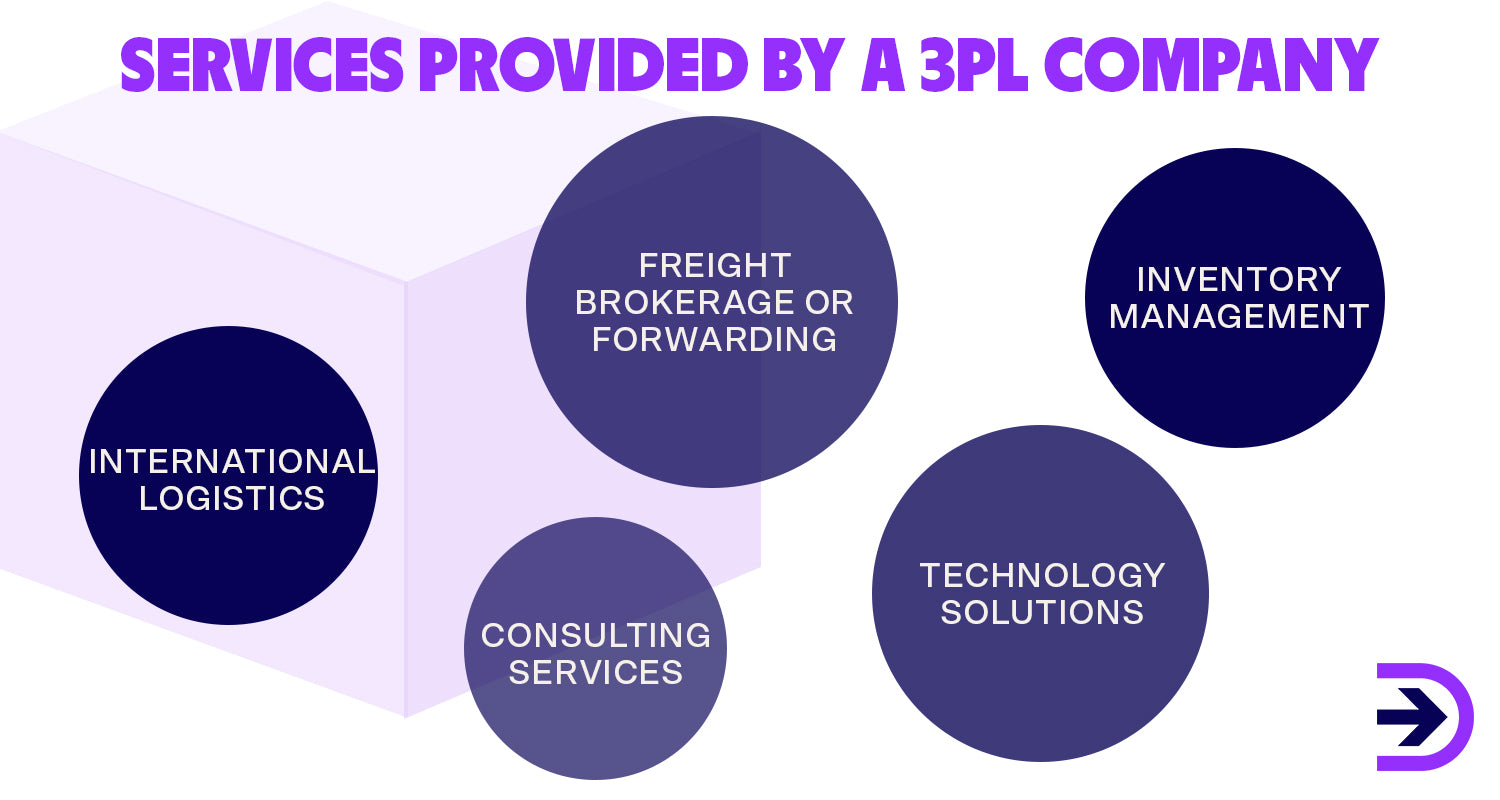
How do most 3PLs work?
3PLs offer logistics services to cover a wide range of supply chain operations and processes. Some 3PLs will focus on one or two aspects of the supply chain, while others offer a fully comprehensive service.
The fulfilment process with a typical 3PL may look like this:
-
The 3PL receives your inventory at their warehouse, where they organise and prepare it for fulfilment.
-
When an order is placed on your website, you forward the information to the 3PL.
-
The warehouse picks and packs the order, after which the 3PL arranges shipping with their courier partners.
-
The package is shipped from the 3PLs warehouse or distribution centre, and you’ll receive shipping and tracking information to pass on to your customer.
-
The package is delivered to the customer by the chosen courier.
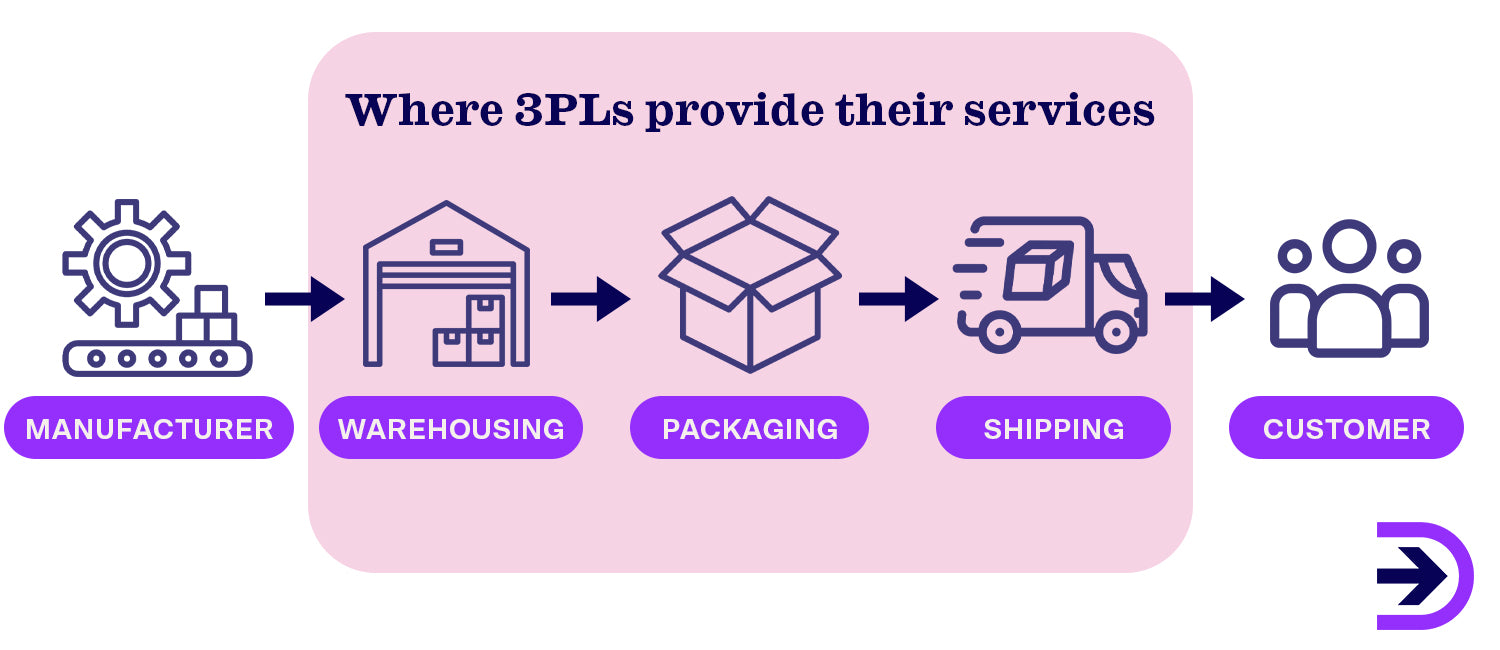
Some 3PLs also offer reverse logistics, which involves processes that move goods from the customer back to the seller or suppliers. This may include repairs, returns, recalls, resale and product recycling or disposal.
There are four main types of 3PLs:
Standard 3PL providers
These companies provide basic logistics at a lower cost than other, more comprehensive services. These may involve the storage and transportation of goods, and sometimes distribution. Standard 3PL providers are a good choice for small businesses or start-ups that want to optimise their logistics on a budget.
3PL service developers
In addition to the services covered by a standard provider, 3PL service developers offer additional services and infrastructure. This may include security, tracking, cross-docking and package selection.
3PL customer adapters
A comprehensive logistics solution, customer adapters handle nearly all end-to-end logistics for your business. They can provide technological support such as transport management systems (TMS). They may also provide services such as reverse logistics and customer service support. These companies are ideal for businesses with complex logistics that require custom-tailored solutions.
3PL customer developers
While 3PL customer adaptors will take over and manage your existing logistics, 3PL customer developers will take complete ownership of your company's logistics operations, acting as an outsourced department with their own assets instead of an extension of your company. These companies are best suited to large businesses with complicated operations and limited resources who do not need the support of an in-house team.
Here are some other common 3PL types you may come across through your research:
Asset-based/non-asset-based providers: An asset-based 3PL company uses their own assets to handle your logistics. They own their own equipment, vehicles and warehouses, and they employ their own workers or contractors. As such, their service area is limited to their asset locations. A non-asset-based 3PL company does not own their own assets but outsources them. The larger a non–asset-based company’s network, the wider the potential service area and the more solutions they can offer your business, though that comes with less control.
Financial-based 3PL services: These companies optimise your supply chain by reducing your operating costs. This may be achieved through negotiating contracts, adding value to your products, providing auditing software, and analysing shipping data to find the best rates.
Forwarder-based 3PL services: These companies are typically non-asset-based and focus on the delivery of goods between locations. For example, moving inventory from your warehouse to the courier that will deliver your customer’s package.
Information-based 3PL services: These companies are online-based, leveraging technology and electronic markets for logistics services. They mainly focus on B2B operations.
Transportation-based 3PL services: These companies primarily focus on transportation services including trucking, freight forwarding, shipping and other methods of transportation.
Warehouse and distribution-based 3PL services: These companies primarily focus on warehousing and distribution services including order fulfilment, inventory management, packing and picking.
Cold-chain logistics providers: A cold chain is a supply chain that deals with climate-sensitive products such as food and medications. Cold chain logistics providers specialise in the transportation of these goods in climate-controlled vehicles, warehouses and more.
Why would your business engage in 3PL?
Optimise resource management
All businesses have a limited supply of resources, whether it is money, time, employees or warehouse space. By outsourcing logistics and fulfilment, you can save valuable resources and maintain a competitive edge. 3PLs can also help reduce shipping costs, provide technological infrastructure, and otherwise optimise your supply chain, making it more efficient as well as affordable.
Lack of expertise/experience
3PLs can be an excellent solution for small businesses and start-ups with little to no experience in logistics and fulfilment. Instead of relying on trial and error, you can nail your fulfilment processes right away while also benefiting from expert guidance and insights from your 3PL partner.
Scalability
3PLs can help grow and scale your business. If your business has reached a new level of growth, third party logistics providers will help transition your logistics from one inventory level to another. They can help you move large volumes of products around the country in the most efficient manner. They can aid with international expansion and help deal with issues such as customs regulations and language barriers. As your logistics become more complex, your 3PL partner can custom-tailor solutions to suit your size and budget, ensuring your business is operating efficiently at any stage.
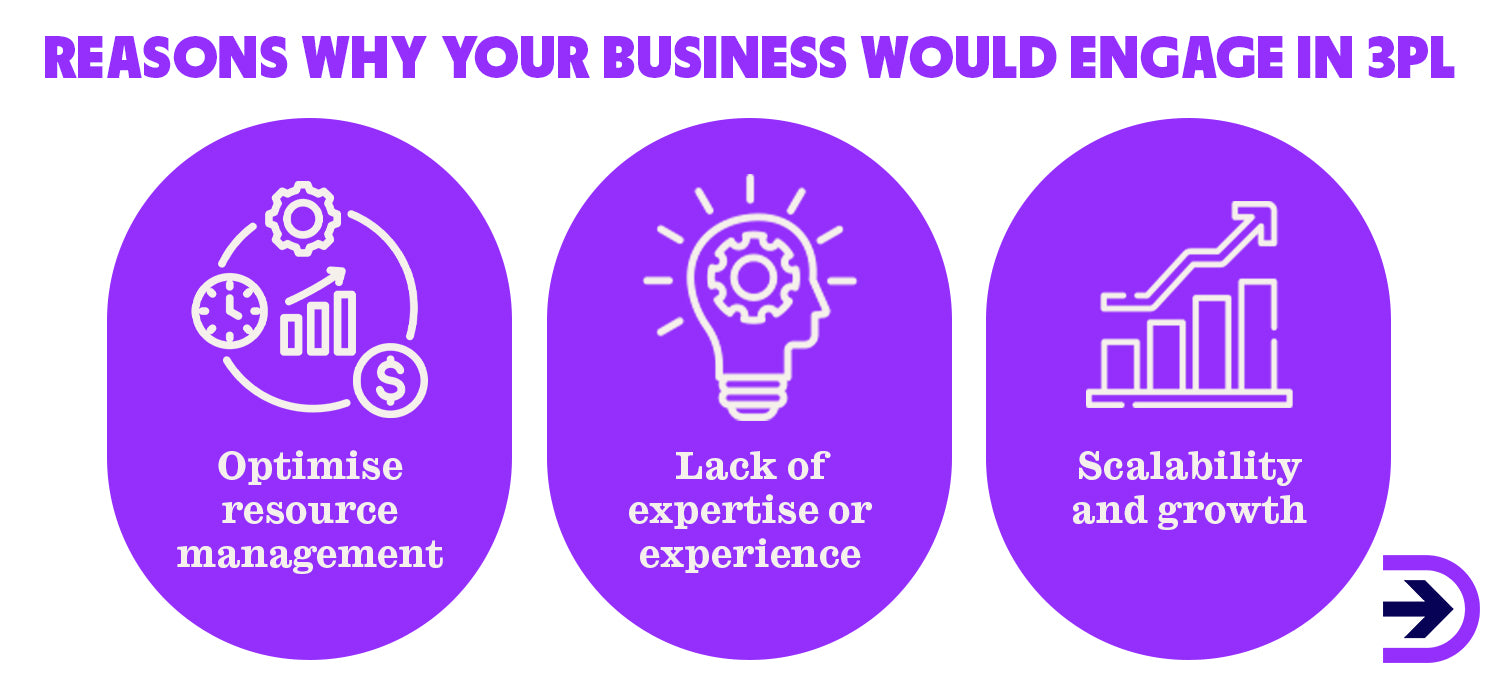
Is 3PL just for ecommerce businesses?
3PL is not exclusively for ecommerce businesses. Any business that has high shipping demands can make use of third party logistics providers. However, 3PL would not be possible without advancements in technology to facilitate communication (most notably the internet), and it is in high demand across ecommerce. This is because many online businesses lack the infrastructure necessary for in-house logistics (such as warehouses) and must rely on outsourcing. Although it's easier than ever to start an ecommerce business, many startups are also working on a shoestring budget, making it far more time and cost effective to outsource logistics than to build them from scratch. With ecommerce brands growing at an exponential rate, 3PLs are uniquely positioned to help online businesses handle increasing global shipping demands.
Benefits and Disadvantages of 3PL
Benefits of 3PLs
Reduced costs
Good third party logistics providers will find the most efficient and cost-effective route for your products through the supply chain. They can leverage their network and negotiate contracts to make sure you’re always getting the best transport and courier services at the best price. Finally, the use of 3PLs can reduce your overall capital investment - you don’t need to invest in warehousing, transportation or software right away, you only need to invest in the right partnership.
Automation
As technology improves and AI advances, it becomes easier to streamline daily processes. However, even businesses with dedicated IT teams may struggle to automate processes with so many moving parts. Technology-based 3PLs can provide turn-key services and solutions to companies looking to automate. These may include transportation management systems (TMS), warehouse management systems (WMS), automated picking and packing or inventory management, and more. By automating these processes, you can continue to operate at peak efficiency while saving money on labour and reducing mistakes caused by human error.
Increased customer satisfaction
A more efficient supply chain means more efficient deliveries. By partnering with a 3PL provider, you can enhance customer satisfaction through faster order fulfilment, accurate inventory management, faster delivery and a smoother returns process.
Specialisation
The sheer scale of global commerce can make logistics management seem like an impossible task. Coupled with global trade disruptions caused by geopolitical, climate and health crises, it can be difficult to navigate the complexities of the global supply chain. Then there are the aspects of logistics unique to your business: for example, if you transport goods that require climate-controlled conditions, customised packaging, or careful handling, 3PLs can take care of that for you. Not only do they have the knowledge and resources to get your products moving, but many 3PL providers offer boutique logistics tailored to their chosen industries. Distinguishing features of these specialised 3PLs may include high levels of customer service, value-added services such as custom packaging or kitting, and access to preferred sales channels (such as luxury retailers or marketplaces). Specialised 3PLs will also be up-to-date on the latest industry trends, best practices, new technologies and any looming threats or disruptions on the horizon.
More time for your business
Most managers will know the importance of delegation: it is important to identify what tasks need to be passed to others so you can work on what’s important. By outsourcing your logistics, you can focus time and resources on core competencies such as product quality, procurement, customer service or marketing.
Disadvantages of 3PLs
Less control
By outsourcing your logistics management, you naturally give up some control over your product distribution. You may only have limited visibility over the day-to-day processes, which may make it difficult to catch certain errors. Additionally, customers will often attribute any problems that arise during delivery to your business. This includes shipping delays, difficulties in the returns process and other order fulfilment complications. For your partnership to work, you must use a 3PL provider that you can trust. This means choosing a provider that has a reliable network, prompt communications, and the infrastructure to keep up with your shipping demands. You must do your research and choose carefully, as any errors will be your loss.
Becoming dependent on your 3PL partner
A key benefit of 3PLs is that they can cover a lack of experience in logistics. However, this very benefit will put you at a disadvantage if your 3PL stops performing well, if you need to change providers, or if you need to renegotiate the terms of your partnership. You can prevent this by choosing a 3PL that is transparent and provides up-to-date, comprehensive reports.
Large upfront cost
Setting up a 3PL partnership can be costly, depending on the level of service your business requires. You’ll need to read your contract carefully to ensure you’re not locking yourself in for years of additional fees and other expenses. However, depending on your business size and the number of SKUs, the long-term cost savings will outweigh the initial investment.
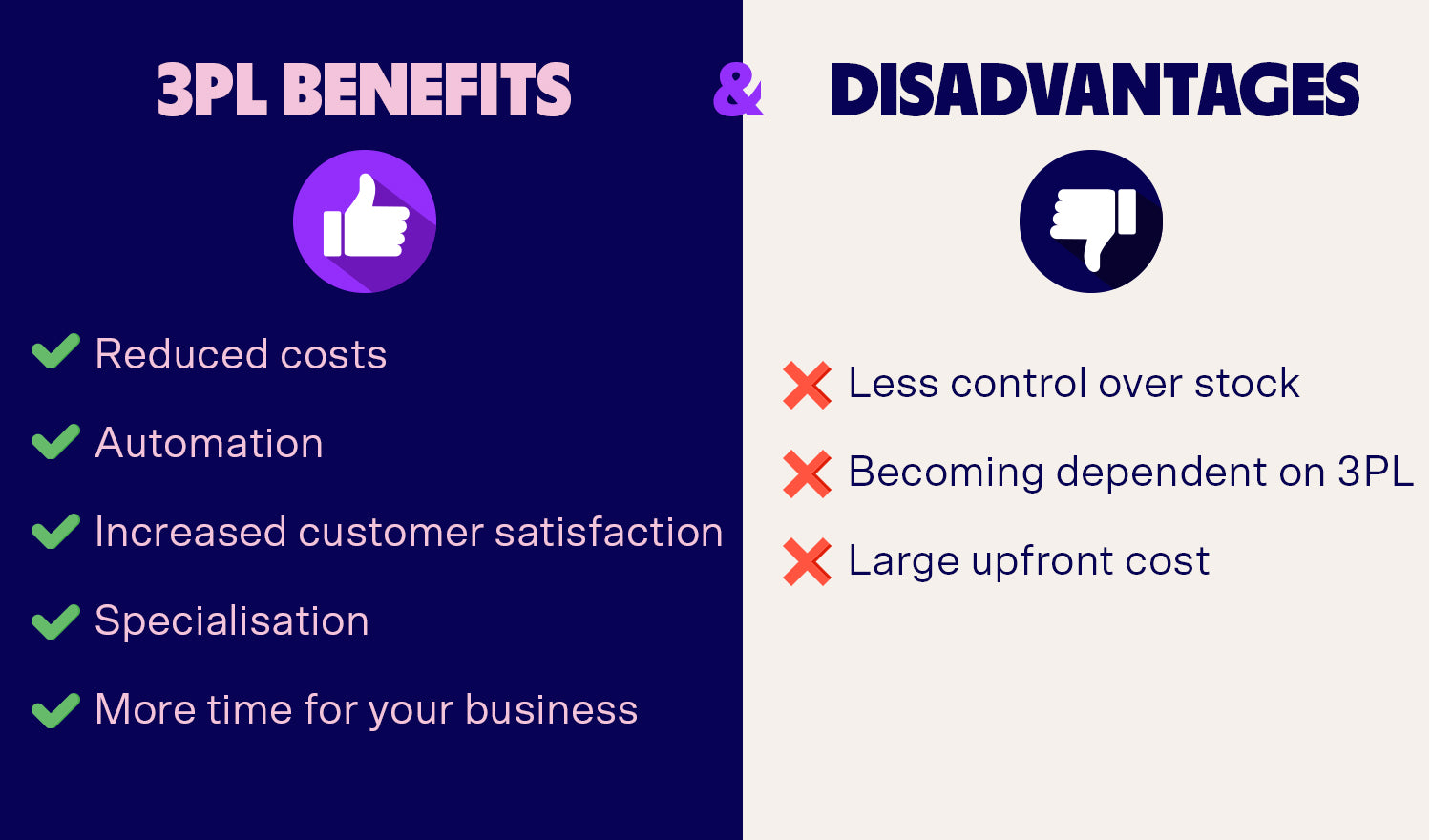
3PLs vs 4PLs
While looking for a fulfilment provider, you may have come across the term “4PL”, or fourth-party logistics. While both providers play critical roles in logistics and supply chain management, the scope and complexity of services vary between the two. Businesses will directly interact with 3PLs to develop logistics solutions, while 4PLs offer a more comprehensive and integrated approach, acting as an intermediary between your business and 3PLs. Key differences include:
-
Scope of service: While a 3PL may only take over aspects of your logistics, 4PLs typically provide more strategic planning and coordination across the whole supply chain.
-
Single point of contact: 4PLs act as a single point of contact between multiple 3PLs and other service providers across the supply chain.
-
Business relationship: 4PLs work with your business to create long-term strategies, while 3PLs work alongside your existing supply chain infrastructure and focus on more immediate day-to-day operations and costs.
-
Assets: Most 4PLs are non-asset based. Their value comes from their expertise, their network, and their integrations.
-
Flexibility: Both 3PLs and 4PLs are designed with flexibility in mind, but 3PLs are limited to the scope of services. Thanks to their larger scope, 4PLs can respond faster to market fluctuations and reconfigure the supply chain network as required.
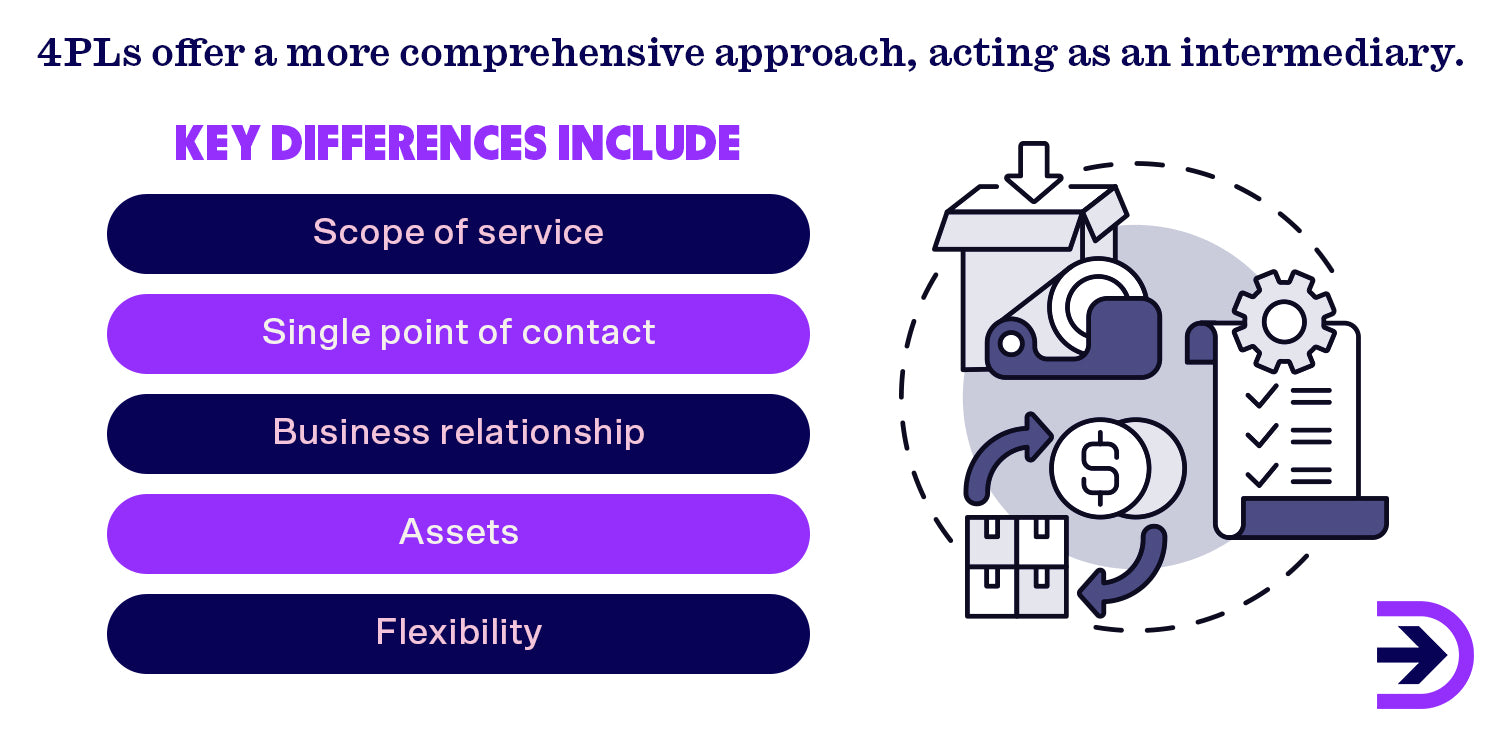
If you’re a small business looking to expand or if you’re experiencing a period of sudden, rapid growth, then a 3PL might be the right fit for you. For enterprise-level businesses with high shipping demands, a 4PL may be better suited to meeting your demands.
3PL vs Dropshipping
Dropshipping is an ecommerce fulfilment method where a retailer does not own any inventory. Instead, they buy products from a third-party supplier as orders arrive, and the supplier ships them directly to the customer. Dropshipping eliminates the need for inventory storage and reduces upfront costs, making it an attractive option for SMEs.
3PLs and dropshipping are both models that businesses can use to manage their supply chains, fulfil customer orders and facilitate product delivery. However, they operate in distinct ways that offer different benefits and challenges for businesses.
One of the primary advantages of dropshipping is its low barrier to entry. As businesses don’t need to invest in inventory, warehousing or even office space, they can start selling products with minimal upfront investment. It also allows established businesses to test new product ideas and new markets without significant financial risk. Businesses that work with 3PLs own their inventory but outsource their inventory management at a cost.
Like with 3PLs, dropshippers don’t have total control over the shipping process and must rely on suppliers to provide packaging, choose reliable couriers, and deliver the customer’s package safely. Since dropshippers also don’t manufacture their products, they have limited customisation options compared to some 3PL services. However, there are ways to get the service that 3PLs offer while dropshipping. For example, white-label and private-label dropshipping suppliers allow you to dropship products using your labels and packaging. Artists can use print-on-demand to print their original/customised designs onto everyday items like t-shirts and mugs for dropshipping. Best of all, many marketplaces that facilitate dropshipping allow you to integrate and automate your online store using apps, such as Dropshipzone’s Sofortig for Shopify.
Functionally, a customer cannot tell the difference between a 3PL or a dropshipper unless they look at the return address. However, 3PLs can make the customer experience run more smoothly with faster shipping times, reverse logistics management and integrated tech solutions. Depending on the location of the supplier, dropshippers can have a hard time competing with this level of service. This is why dropshippers need to choose reliable, local suppliers with a good customer service history.
If you’re not sure whether you want to employ a 3PL or a dropshipping supplier, consider the following:
-
How much control do you want over your products and/or shipping processes?
-
How much working capital do you have?
-
Do you require flexible logistics? For example, do your products experience seasonal demand?
-
How will you manage customer expectations around delivery times and returns?
-
Do you have the expertise or infrastructure to support 3PL or dropshipping capabilities?
No matter which method you choose, hunting for the right 3PL or the right dropshipping supplier can be a hassle. With Dropshipzone, you don’t have to look far. We connect our dropshipping Suppliers with eager Retailers around Australia, making it easy to find high-quality, reliable suppliers across a range of product categories. To find out more about how dropshipping can help you start and scale your business, check out our blog “What is Dropshipping and How Does It All Work In 2024?”.
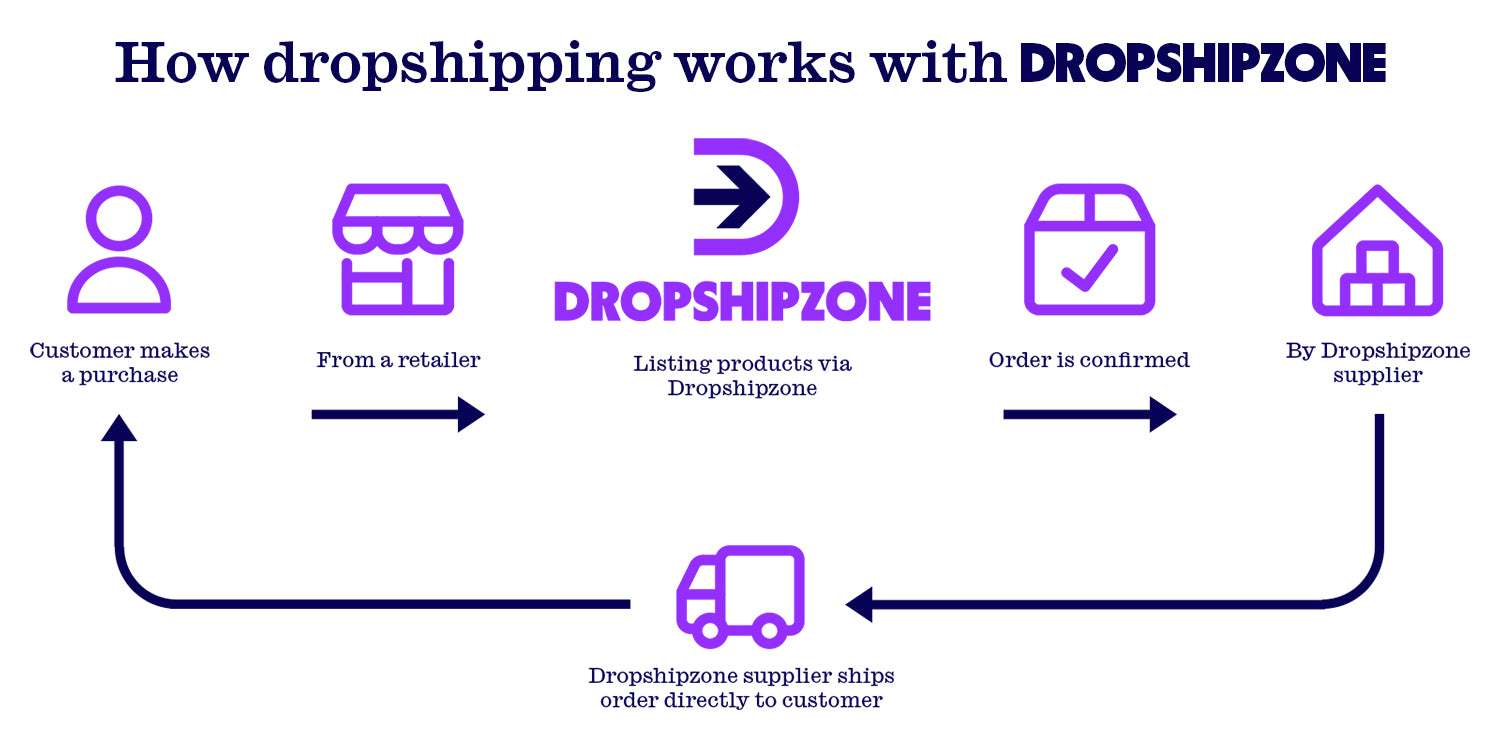
How to choose the right 3PL for your business
Choosing the right 3PL provider for your business is a critical decision that will significantly impact the efficiency, profitability and competitiveness of your business. With many 3PLs on the market providing a wide range of services, it’s essential to carefully consider your needs and goals and choose a partner that aligns with your business objectives.
Consider the unique needs of your business
Every industry comes with a unique set of needs, from customer expectations to storage space requirements. Before choosing a 3PL provider, you need to clearly define your logistics needs, objectives and priorities. Identify the specific services you need from 3PL such as customs brokerage, cold-chain storage, inventory management, or value-added services. Consider factors about your geographic scope, product characteristics, demand fluctuations, and desired service levels. Also, consider the future of your business: does your provider have the capabilities to grow and change with your business?
Evaluate their core competencies
Look for providers that have experience and expertise in your industry. Assess their infrastructure, technology, resources, and geographic coverage to ensure they can meet your current and future needs. Do they specialise in the areas you require?
Check their performance and reliability
Assess the performance of potential 3PL providers based on factors such as on-time delivery, order accuracy, customer service responsiveness, and overall service levels. You can request references or case studies from existing clients, or you can research company reviews to gauge customer experiences. Where possible, you should conduct site visits to evaluate their facilities first-hand. This will also help to establish a deeper relationship with your provider, should you decide to do business with them.
Assess communication skills
Effective communication is essential to building a successful partnership. Evaluate your provider’s communication channels, response times, accessibility and willingness to collaborate. Make sure to set clear expectations around performance and develop clear metrics to ensure accountability. Choose a provider that is transparent about their business and provides extensive reporting - the more you know about your logistics processes and your provider’s performance, the better prepared you will be for unexpected circumstances and contract negotiations.
Check their safety and security
Your 3PL’s approach to health, safety and security will speak to their overall performance. A provider that cuts corners on safety is an unreliable partner and a liability to your business. You’ll also want to make sure their cybersecurity is up to date. Cybercrime is on the rise, with ecommerce businesses losing upwards of $48 billion to fraud every year. Your 3PL provider should have protections in place for various types of ecommerce fraud, from data breaches to identity theft.
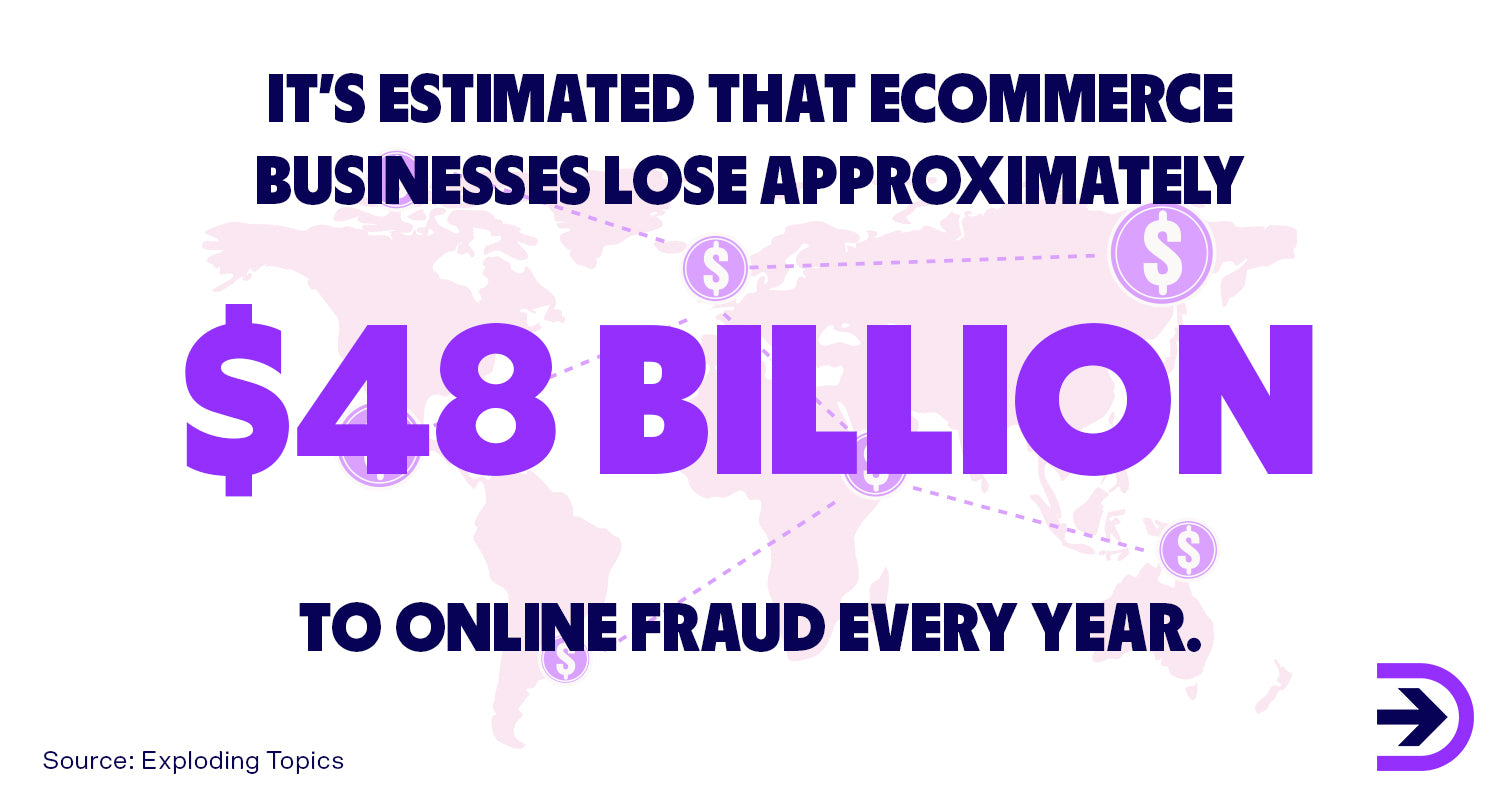
Negotiate service agreements and contract terms
Once you've identified a preferred 3PL provider, negotiate service agreements and contracts that clearly outline the scope of services, performance expectations, service levels, pricing structure, payment terms, termination clauses, and dispute resolution mechanisms. Ensure that the agreement reflects your business's needs, priorities, and risk tolerance while providing flexibility for future adjustments or expansions.
3PL FAQs
What do third-party logistic providers (3PLs) do?
Third-party logistics providers (3PLs) are specialised companies that offer a range of logistics services to businesses. These services typically include transportation, warehousing, inventory management, order fulfilment, and distribution. By outsourcing these functions to 3PLs, businesses can focus on their core competencies while benefiting from the expertise and resources of logistics professionals.
What is the difference between 3PLs and dropshipping?
While 3PLs and dropshipping are both fulfilment methods, they function very differently. In dropshipping, a retailer does not own their inventory and has little control over their products, and shipping is outsourced to suppliers. With 3PLs, retailers own their inventory but may outsource fulfilment, storage, transportation and/or order fulfilment. Dropshipping has a lower barrier to entry, but both methods can help grow and scale businesses.
What are the different types of 3PLs?
There are four main types of 3PLs:
-
Standard service providers provide basic logistics services, namely order fulfilment and transportation.
-
Service developers offer additional services and infrastructure including value-added services, security and infrastructure.
-
Customer adaptors integrate with businesses to provide nearly all end-to-end logistics including technological, customer service and reverse logistics support.
-
Customer developers take complete ownership of your logistics operations, acting as an outsourced department instead of an extension of your company.
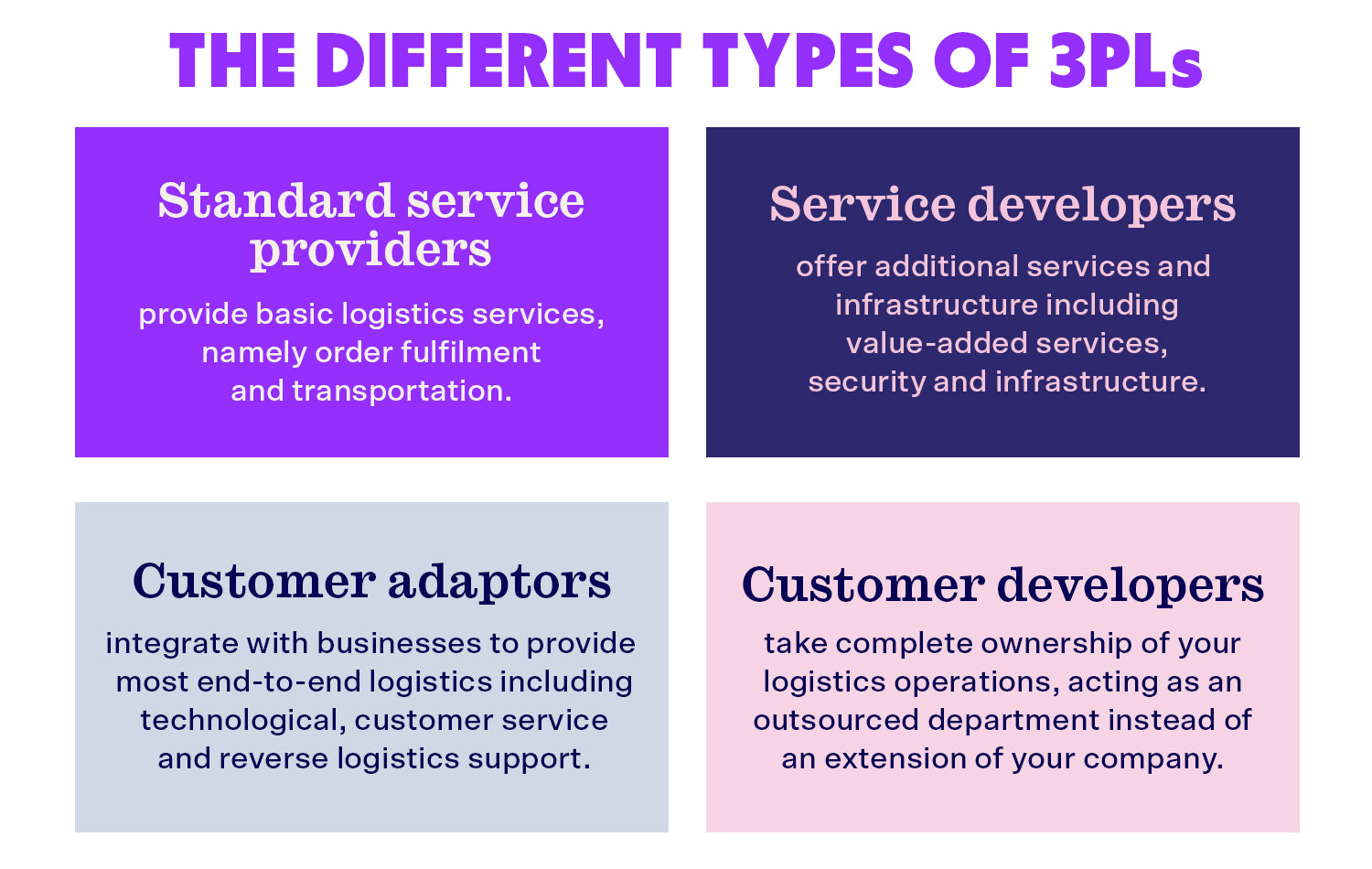
What is the difference between 3PL and 4PL?
3PLs and 4PLs both provide logistics services but differ in their scope or operations and level of integration. 3PLs typically manage specific tasks within the supply chain, while 4PLs take on a more holistic approach. 4PLs act as a single point of contact with multiple 3PLs to achieve your logistics needs. This makes 4PLs ideal for large enterprises, while 3PLs are more suited to SMEs.
Is Amazon a 3PL? What’s the difference between a 3PL and FBA?
Fulfilment By Amazon (FBA) and Amazon Multi-channel Fulfilment (MCF) can both be considered 3PLs. FBA is specific to the Amazon marketplace, allowing sellers to benefit from Amazon's traffic, visibility, and marketing tools, but they are also subject to Amazon's rules, policies, and fees. Amazon MCF enables sellers to take advantage of Amazon's extensive logistics network, fast shipping options, and efficient order processing capabilities. This includes access to Amazon's Prime shipping program, which offers fast and reliable delivery to customers. Unlike FBA, MCF is designed to integrate seamlessly with various sales channels including ecommerce platforms, online marketplaces, brick-and-mortar stores, and wholesale distribution channels. Sellers can manage their inventory and fulfil orders from multiple channels using Amazon's centralised platform.
Should I use my own warehouse or a 3PL?
Owning your own logistics infrastructure has its advantages. You have more control over the fulfilment process, and depending on the size of your business, you may save money when it comes to warehousing and storage fees. However, if your business has many SKUs, global customers and high shipping demands, the strain on your resources can become unsustainable. 3PLs provide a safety net for unexpected demand, global disruptions or rapid expansion, giving you more flexibility. Finally, it can be hard to live up to customer expectations when it comes to delivery in the age of Amazon. Often, businesses will have to balance between shipping orders carefully, affordably or quickly, and it is difficult to achieve all three at once. Using a 3PL can help you deliver an optimal customer experience without compromise.








